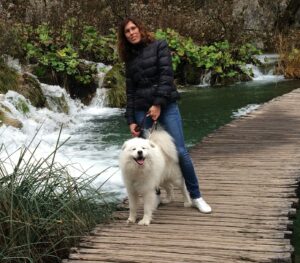14 October 2020
To better understand what working on COVID-19 during the pandemic entails, we have interviewed RECOVER investigator Dr. Đurđica Cekinović Grbeša about her research and day-to-day activities.
What is your role within RECOVER/in the COVID-19 pandemic and what it entails?
Within RECOVER, I am one of the investigators involved in recruiting patients into the MERMAIDS-ARI study. This includes identifying patients that potentially meet the inclusion criteria for the study among hospitalised patients in the Clinic for Infectious Diseases of the Clinical Hospital Center Rijeka, where I work. If these patients fulfil the criteria for recruitment, I present them with the study aim and the protocol, and acquire their signed informed consent. During the patients’ involvement in the study, I follow the data on their treatment and follow-up visits. During the COVID-19 pandemic there has been an increased number of hospitalisations of elderly patients with severe form of the disease, which provides a wide pool of patients for the recruitment. However the follow-up is mainly uncertain.
Could you tell us a little bit about the project/work you’re involved in?
MERMAIDS-ARI (Multi-centre EuRopean study of Major Infectious Disease Syndromes – Acute Respiratory Infections) study aims to investigate ethology, clinical course and outcome of acute respiratory infection (ARI) in patients with mild form of the disease that either get treated by their GP, or ones with severe ARI that requires hospitalization. Since respiratory infections are the most frequent infections in humans, this approach allows us to study the factors that discriminate between these two groups of patients, and especially to study why some people develop severe form of the respiratory infections. Results could improve prevention and treatment of these infections, which are a high burden on medical care.
What is the expected impact of the work you’re doing?
Results of this study are primarily aimed at improving prevention, care and treatment of respiratory infections which are a high burden on healthcare systems. As one of the collaborators involved in recruiting patients and their follow-up my impact is small, but hopefully important.
In the context of COVID-19, what are some of things you’ve found easy/challenging to work with?
Easy to work with?
Everyone from the Oxford University and the University of Antwerp that I have collaborated with was very helpful and forthcoming.
Challenging to work with?
- It is always challenging to work with patients and anticipate their response when presenting the study and convincing them to participate. It takes a lot of effort to “simplify” the aims and scopes of the study to the patients, and encourage them to be a part of the Study.
- In the context of COVID-19, the outcome of the disease in elderly is difficult to predict. Since I work in the hospital, I come in contact and treat patients with severe forms of COVID-19 in which prognosis is uncertain. This also reflect on the study procedure, since at the time of patient recruitment it is difficult to predict if the patient will be involved all throughout the study.
Do you have any lessons to share for the future?
In my opinion, the most important lesson from this pandemic is to follow recommendations given by specialists, collaborate and share experiences and protocols for treatment and care of COVID-19 patients. Regarding the ARI study, I can only express my happiness to have been involved in such big, multi-centre study which will spawn important results that will definitely improve the understandings of the course and outcome of respiratory infections in different patient groups.
About Đurđica Cekinović Grbeša

Dr. Đurđica Cekinović Grbeša is a Medical Doctor specialised in infectious diseases working at the Clinic for Infectious Diseases, Clinical Hospital Center Rijeka, Croatia. In addition, she works as the Assistant professor, Department of infectious diseases, School of Medicine, University of Rijeka.
Đurđica is involved as a researcher in European Union research projects focused on infectious diseas. She holds a PhD in biomedicine and health from the University of Rijeka.